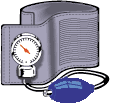|
Hypertension, or high blood pressure, is a dangerous condition associated with an increased risk of stroke, heart disease, and kidney failure. Often, high blood pressure is just another consequence of aging, but new research suggests that folate intake may reduce the risk of hypertension, especially in younger women.
In a study presented at a recent American Heart Association conference, scientists presented data obtained from two separate studies of women between the ages of 43 and 70, and 26 to 46, respectively. In each study, the women completed detailed questionnaires about their diet, food preparation, physical activity, health habits (including folate intake), and blood pressure levels every two years, for an average of eight years. None of the women had high blood pressure when they enrolled in the study.
 The study found that older women who consumed 800 or more micrograms per day of folate were 13 percent less likely to develop high blood pressure over the eight-year followup period compared to women who consumed less than 200 micrograms daily, while younger women had a 29 percent reduction in the risk of developing hypertension. Younger women who consumed 800 or micrograms of folate daily had a 39 percent reduction in the risk of hypertension compared to those who did not supplement with folic acid. The researchers suggested that high folate intake “may reduce the risk of hypertension,” and that folic acid supplements “may contribute to this decrease in risk.” The study found that older women who consumed 800 or more micrograms per day of folate were 13 percent less likely to develop high blood pressure over the eight-year followup period compared to women who consumed less than 200 micrograms daily, while younger women had a 29 percent reduction in the risk of developing hypertension. Younger women who consumed 800 or micrograms of folate daily had a 39 percent reduction in the risk of hypertension compared to those who did not supplement with folic acid. The researchers suggested that high folate intake “may reduce the risk of hypertension,” and that folic acid supplements “may contribute to this decrease in risk.”
So load up on those foods high in folate, including citrus fruits, asparagus, brussel sprouts, spinach, chicken, brown rice, kidney beans and lentils. Need more information about hypertension or general health? Ask your doctor of chiropractic, and for more information about women's health, visit www.chiroweb.com/find/tellmeabout/women.html.
Reference
Forman JB, Rimm E, Stampfer M, Curhan G. Folate intake and the risk of incident hypertension in U.S. women. Presented at the American Heart Association 58th Annual Fall Conference and Scientific Sessions of the Council for High Blood Pressure Research, Chicago, Ill., Oct. 11, 2004.
|



